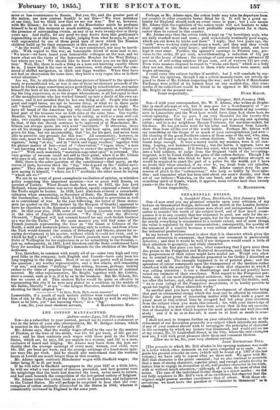THE COTTON MANUFACTURE.
Ashton-under-Lyne, 7th February 1855. Sin—As a subscriber to your journal, permit me to correct a statement or two in the letter of your able correspondent, Mr. W. Bridges Adams, which is inserted in the Spectator of January 27. Mr. Adams says, that the weekly wages offered to the men by the masters of Preston, at the time of the strike, was 13s. 6d. per week, or 351. per an- num; and he then contrasts such wages with those paid in the United States, which are, he says, 241. per annum to a woman, and 541. to a man, exclusive of board and lodging. Mr. Adams may learn from the best au- thority that the average earnings of every man, woman, and child, were 10s. 10d. per head per week, and the average earnings of a hand-mule spin- ner were 24e. per week. And he should also understand that the working hours at Lowell are much longer than in this country. Mr. Adams again contrasts Manchester wages with Sheffield wages; the latter being 31. to 51. per week. If he will refer to Sheffield newspapers in the year 1847 or a little later, he will see what a vast amount of distress prevailed, and how general were the misgivings that the trade had deserted the town, never more to return, and had sunk beneath the competition of the low-priced cutlery of Belgium. Mr. Adams terms the cotton trade an exotic in Lancashire, and indigenous in the United States. He will perhaps be surprised to hear that the con- sumption of cotton seriously diminished in the States in 1864, whereas it considerably increased in England in the same year. Perhaps, as Mr. Adams says, the cotton trade may take its departure from our country to other countries better fitted for it. It will be a great ca- lamity for England should such an event come to pass; but I can assure Mr. Adams that the capitalists of the cotton trade will not hesitate to take their capital to the States and seek profitable employment for it there, rather than be ruined in this country.
Mr. Adams says that the cotton trade is kept up "by hereditary serfs, who are daily crushed more and more ; paid occasionally nominally good wages, which are cut down by tricks and fines." I reply, that two years ago, the "serfs" were working sixty-nine hours a week, and they said they would henceforth work only sixty hours ; and they carried their point, and have kept it ever since. Further, the spinner's earnings in Preston rose, pre- vious to the strike, 20 per cent, notwithstanding a reduction of 12j per cent in the hours of labour ; the earnings of card-room workers advanced 22 per cent, of self-acting minders 16 per cent, and of weavers 111 per cent. Even were masters disposed to resort to "tricks and fines," which as a body they are not, they could not resort to them while workers were scarce, and. wages advancing.
I could carry this subject further if needful; but I will conclude by say- ing, that my opinions, though I am a cotton-manufacturer, are utterly op- posed to those of Mr. Cobden respecting the war; and I believe if Manchester Exchange were polled at its busiest hour on any market-day, that nine- tenths of its subscribers would be found to be opposed to Mr. Cobden and Mr. Bright on the present war.


































 Previous page
Previous page